Overview
The article highlights a pressing concern for many startups: the struggle to create engaging and satisfying user experiences. This challenge can be overwhelming, often leaving founders feeling isolated and unsure about how to connect with their audience. However, there is hope. Innovative websites like Stripe, Airbnb, and Notion are stepping in to transform these experiences by offering tailored solutions that truly resonate with users.
These platforms exemplify the power of user-centric design and personalization. By focusing on the needs and preferences of users, they not only improve interactions but also foster a nurturing environment that supports growth. Imagine the relief and excitement of startup founders who discover that these tools can significantly enhance their engagement strategies, ultimately leading to greater satisfaction and loyalty among their users.
As you navigate the complexities of building your startup, remember that you are not alone. Many have walked this path and found success through the support of these innovative solutions. By embracing the resources available, you can create meaningful connections with your audience, driving your business forward in a compassionate and supportive manner.
Introduction
In today’s fast-paced digital landscape, where user expectations evolve at lightning speed, many startups find themselves grappling with the pressure to keep up. The challenge of crafting innovative websites that not only captivate but also engage users can feel overwhelming, especially in a sea of fierce competition. It’s a struggle that many founders experience, and it’s completely understandable to feel lost amidst these demands.
This article takes a closer look at ten groundbreaking websites that are redefining user experience for startups. These platforms are not just changing the game; they are transforming how we interact with users and fostering growth in ways that seemed unimaginable. As founders navigate this intricate web of digital demands, they often wonder: how can they harness these innovative strategies to elevate their own user engagement and drive success?
By exploring these insights, we aim to provide a supportive pathway for you to enhance your approach. Together, we can uncover the solutions that will empower your startup to thrive in this dynamic environment.
RNO1: Transforming User Experience Through Radical Digital Solutions
In the ever-evolving landscape of digital transformation, many tech startup founders face the daunting challenge of adapting to rapid changes. This struggle often leads to frustration and uncertainty, as they seek to create meaningful connections with their audiences. The implications of falling behind in this digital age can be significant, impacting not just brand identity but also customer engagement and overall growth.
At RNO1, we understand these pain points deeply. Our mission is to empower purpose-driven brands with radical solutions that reshape their experiences. We focus on comprehensive branding strategies, identity design, and user-centric digital platform development to create innovative websites that enable new ventures to forge engaging and memorable interactions with their audiences.
We believe in nurturing innovation and adaptability. Our unique approach to digital strategy and activation allows brands to swiftly adjust to changing market dynamics and consumer expectations. This not only drives rapid ROI but also fosters sustainable growth, creating a supportive environment for startups to thrive.
Notably, our subscription models, such as Revolve and Retrn, are designed to provide ongoing support and encourage continuous innovation. They empower brands to connect with their audiences through integrated digital campaigns, enhancing client satisfaction and establishing RNO1 as a trusted partner in a progressively competitive environment.
As we look toward the future, particularly in 2025, we remain dedicated to innovative websites and performance marketing strategies. Our commitment highlights our role in transforming interactions and empowering contemporary founders to achieve digital success. Together, we can navigate this journey, fostering a community where every startup has the opportunity to flourish.
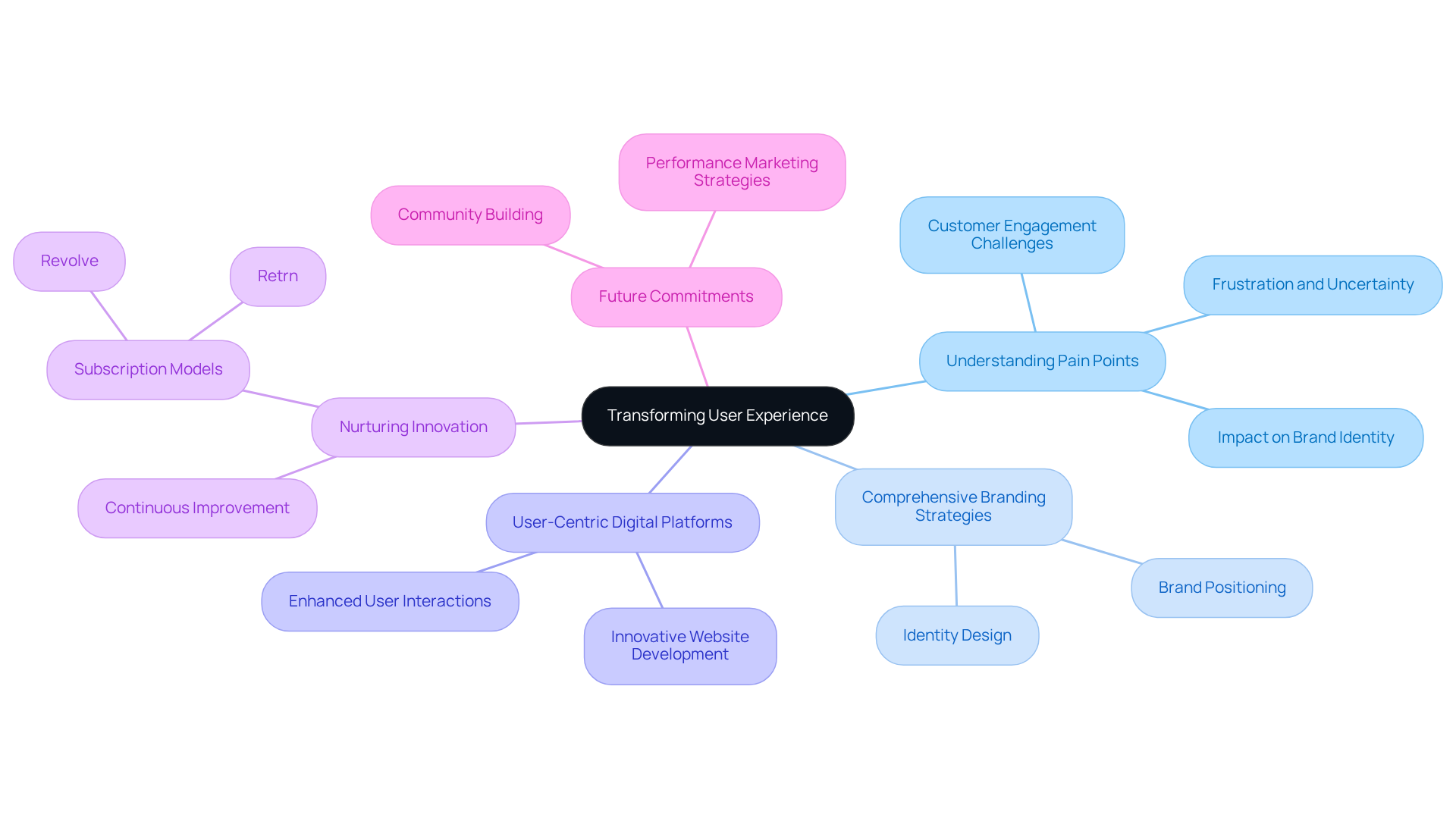
Stripe: Pioneering Seamless Payment Experiences for Users
In the fast-paced world of tech startups, navigating the complexities of payment processing can often feel overwhelming. Many founders grapple with the challenge of creating seamless, user-friendly payment experiences that not only satisfy their customers but also drive conversion rates. This friction during transactions can lead to frustration, ultimately affecting customer loyalty and business growth.
Stripe offers a compassionate solution to this common dilemma. By integrating advanced features like one-click payments and customizable checkout flows, it significantly reduces the barriers that can hinder a smooth payment experience. Startups can leverage Stripe's API to tailor payment solutions that resonate with their customers, enhancing satisfaction and fostering trust.
The effectiveness of Stripe is evident, with around 93% of the top 500 DTC e-commerce brands utilizing its services in Q2 2025. This statistic reflects the platform's reliability and its role in helping businesses thrive. By prioritizing client experience in payment processing, Stripe sets a nurturing standard for startups eager to improve their financial interactions.
Moreover, eCommerce merchants who have embraced Stripe’s prebuilt payment UI have reported an impressive average revenue increase of 10.5%. This not only illustrates the tangible benefits of adopting Stripe but also highlights the potential for growth that lies within the right payment solutions. Additionally, the surge in mobile wallet transactions via Stripe, which increased by about 31% in 2025, aligns perfectly with current trends in payment processing.
As Jeffrey Zeldman wisely noted, 'Usability is like love. You have to care, you have to listen, and you have to be willing to change.' This sentiment resonates deeply with startups, encouraging them to explore Stripe's API features to optimize their payment processes. By doing so, they can create a more inviting and effective payment experience for their customers, paving the way for lasting success.
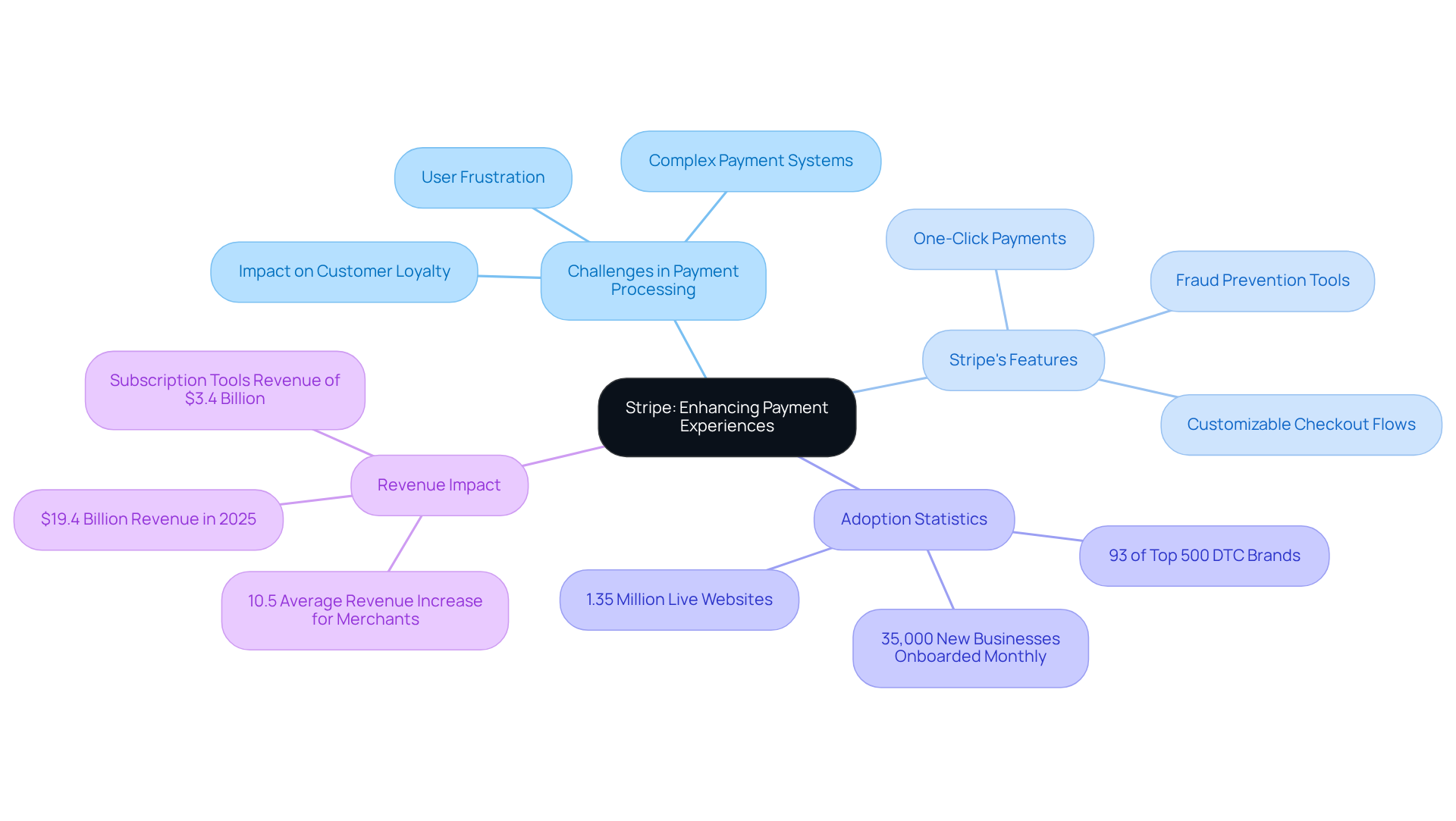
Airbnb: Redefining Travel Booking with Intuitive User Interfaces
In the fast-paced world of travel reservations, many startup founders face a common challenge: the complexity of booking processes. This can lead to frustration for users, who often find themselves overwhelmed by options and unclear navigation. It’s important to recognize how this struggle affects not just the experience of booking a trip but also the potential success of a business in this competitive landscape.
Airbnb has set a powerful example by addressing these pain points with its intuitive interface, which simplifies the search and booking journey. With features like personalized recommendations and streamlined navigation, users feel more engaged and satisfied. It’s heartening to note that a significant 87% of business travelers express a desire for easier booking processes, highlighting the critical role of usability in the travel sector.
For startups in this industry, embracing similar aesthetic principles can create a more user-focused experience. By ensuring that potential clients can easily find and reserve their ideal accommodations, startups can foster a sense of trust and reliability. Focusing on usability and personalization, as Airbnb has done, illustrates how thoughtful planning can lead to business success.
As the travel booking industry is projected to reach $1.63 trillion by 2025, it’s essential for new businesses to adopt innovative websites that reflect these trends. Startups should also consider implementing feedback systems to refine their offerings based on real user experiences. This nurturing approach not only enhances the product but also builds a supportive community around the brand, inviting users to share their thoughts and feelings. Together, we can create a travel experience that is not just functional but truly fulfilling.
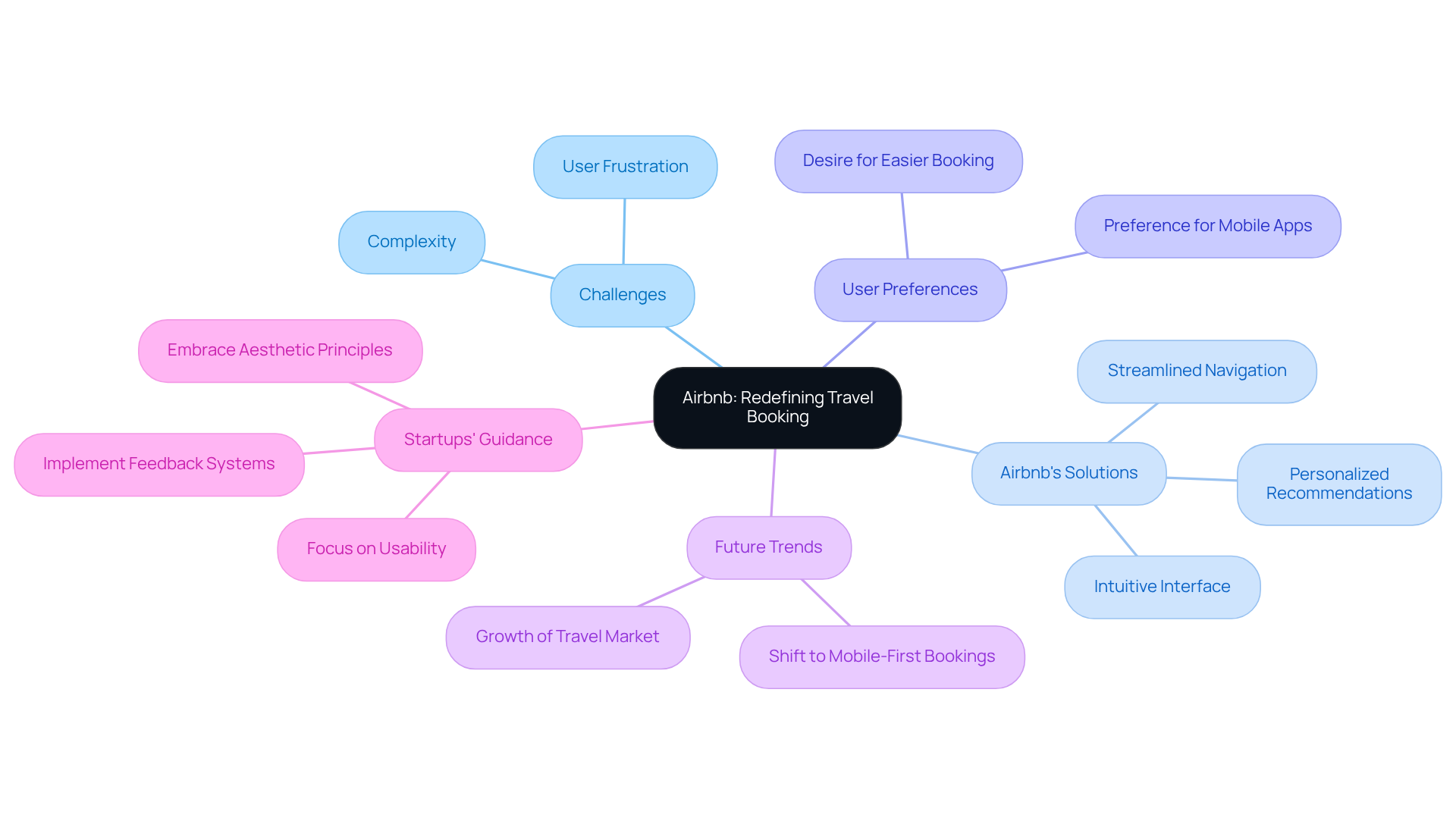
Dropbox: Streamlining File Sharing with User-Centric Design
Many tech startup founders face the daunting challenge of managing file sharing and collaboration within their teams. This often leads to frustration and inefficiency, making it difficult to foster a productive work environment. The implications of this struggle can be significant, affecting not only team dynamics but also overall project success.
Dropbox stands out as a shining example of user-centric design, addressing these very issues with grace and understanding. Their interface is thoughtfully crafted to simplify the complexities of file management, allowing individuals to effortlessly upload, share, and manage files. Features like intelligent organization and real-time collaboration tools not only enhance productivity but also contribute to a more satisfying user experience.
Startups can take a page from Dropbox's book by prioritizing simplicity and efficiency in their own file-sharing solutions. By doing so, they can create an environment that nurtures better collaboration among team members. Imagine the difference it could make—teams working seamlessly together, feeling empowered and connected. This is the supportive solution that RNO1 advocates for, encouraging founders to embrace a design philosophy that truly puts users first.
Notion: Revolutionizing Workspace Organization with Interactive Design
In today's fast-paced world, many tech startup founders face the challenge of keeping their teams connected and motivated, especially after the shift from remote work. This transition can leave employees feeling isolated, with 49% of in-office workers struggling to stay engaged. It's understandable to feel overwhelmed by the need for effective collaboration and productivity in such a dynamic environment.
The implications of this issue are significant. When teams lack the tools to collaborate effectively, productivity can suffer, leading to frustration and burnout. In fact, 70% of employees believe that improved collaboration can lead to better productivity and time savings, highlighting the urgent need for supportive solutions.
This is where Notion shines as a beacon of hope. By revolutionizing workspace organization through innovative websites, it allows individuals to create tailored workflows that meet their unique needs. Notion’s flexibility enables teams to seamlessly integrate notes, tasks, and databases, creating innovative websites that foster a collaborative spirit and can truly transform the workplace.
For startups looking to thrive, adopting Notion's principles can be a game changer. By prioritizing user engagement and adaptability, founders can design tools that empower their team members to work efficiently and feel connected. This nurturing approach not only cultivates a culture of productivity but also aligns with the evolving demands of 2025.
As you navigate these challenges, remember that leveraging tools like Notion is essential. By embracing these interactive principles, you can create an environment where your team feels motivated and supported, ultimately leading to a thriving workplace culture. Together, we can cultivate a sense of community and productivity that resonates deeply with every member of your team.
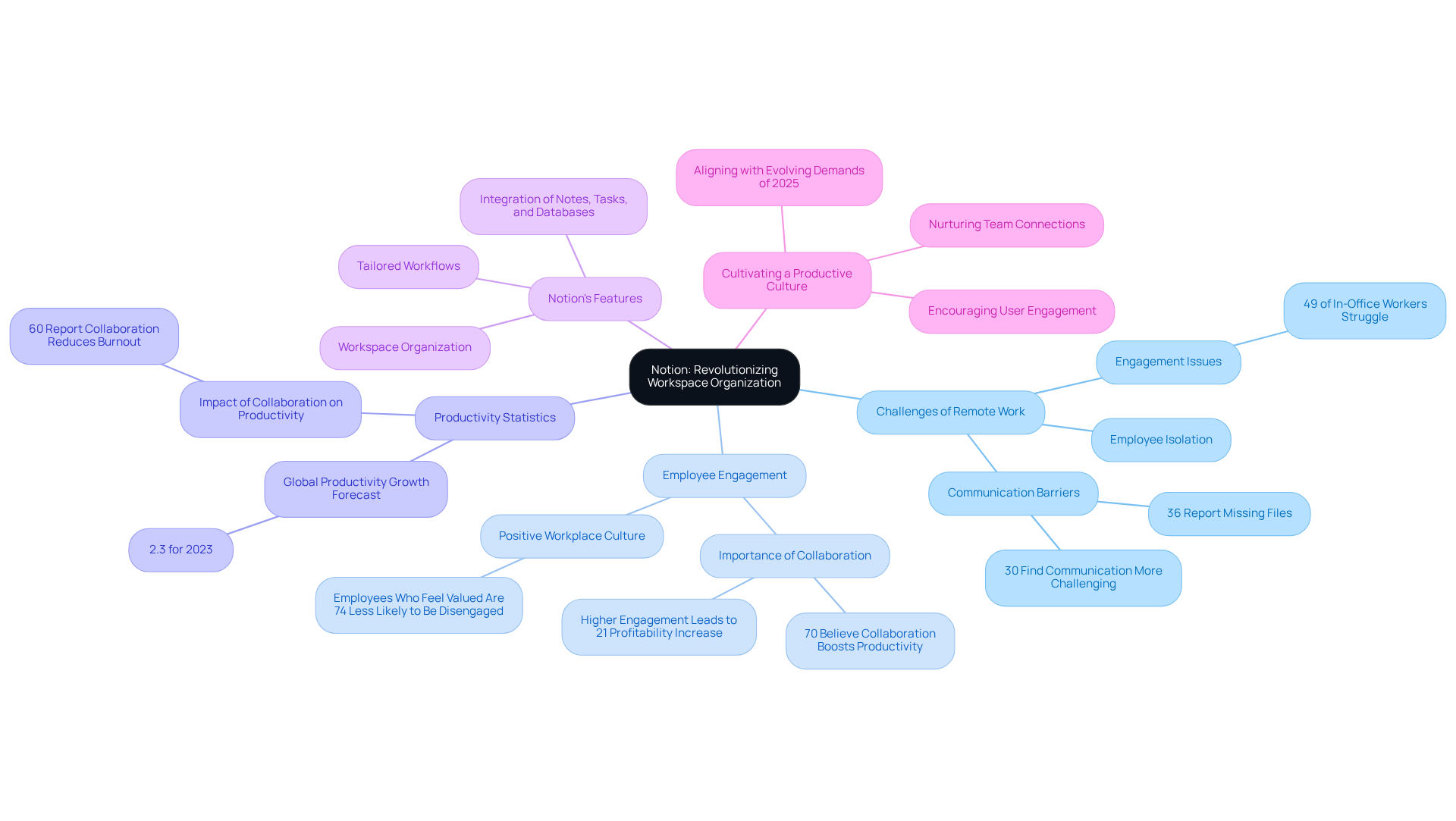
Figma: Empowering Collaborative Design Through Intuitive Interfaces
Collaboration can often feel like a daunting challenge for tech startup founders. Many struggle with fostering an environment where creativity and innovation can truly flourish. This can lead to frustration, as team members may feel their ideas are not being heard or valued. The implications of this challenge are significant, as it can stifle the very essence of what makes a startup thrive—its ability to innovate and adapt.
Imagine a team where everyone feels empowered to contribute their ideas, where feedback flows freely, and where collaboration is not just a buzzword but a daily practice. This is where Figma shines as a collaborative creation tool. Its intuitive interface allows multiple users to modify designs in real-time, nurturing a creative atmosphere that encourages teamwork. Startups can harness Figma’s features, such as version control and design systems, to create a space where every voice is heard and valued, ultimately leading to better outcomes.
RNO1 complements this collaborative spirit with a results-driven approach. By focusing on clear communication and effective project management, teams can remain hyper-focused on delivering measurable success. The benefits are tangible; features like real-time editing and feedback loops can reduce project timelines by up to 30%. This efficiency not only enhances productivity but also alleviates the stress that often accompanies tight deadlines.
As we look toward the future, it’s heartening to note that the collaboration software market is projected to grow at a CAGR of 14.8% by 2025. This growth reflects the increasing recognition of the need for advanced features, such as enhanced integration capabilities and user analytics, in fostering effective teamwork. Moreover, studies show that collaborative teams are five times more likely to excel in creativity and innovation. This highlights the transformative potential of tools like Figma in the dynamic landscape of entrepreneurship.
However, it’s important to acknowledge that many employees find it more challenging to collaborate across departments than within their own teams. In fact, 41% of employees express this struggle. This is why tools like Figma are not just beneficial but essential for overcoming these hurdles and driving effective teamwork. By embracing such collaborative tools, startup founders can foster an environment where creativity thrives and every team member feels supported.
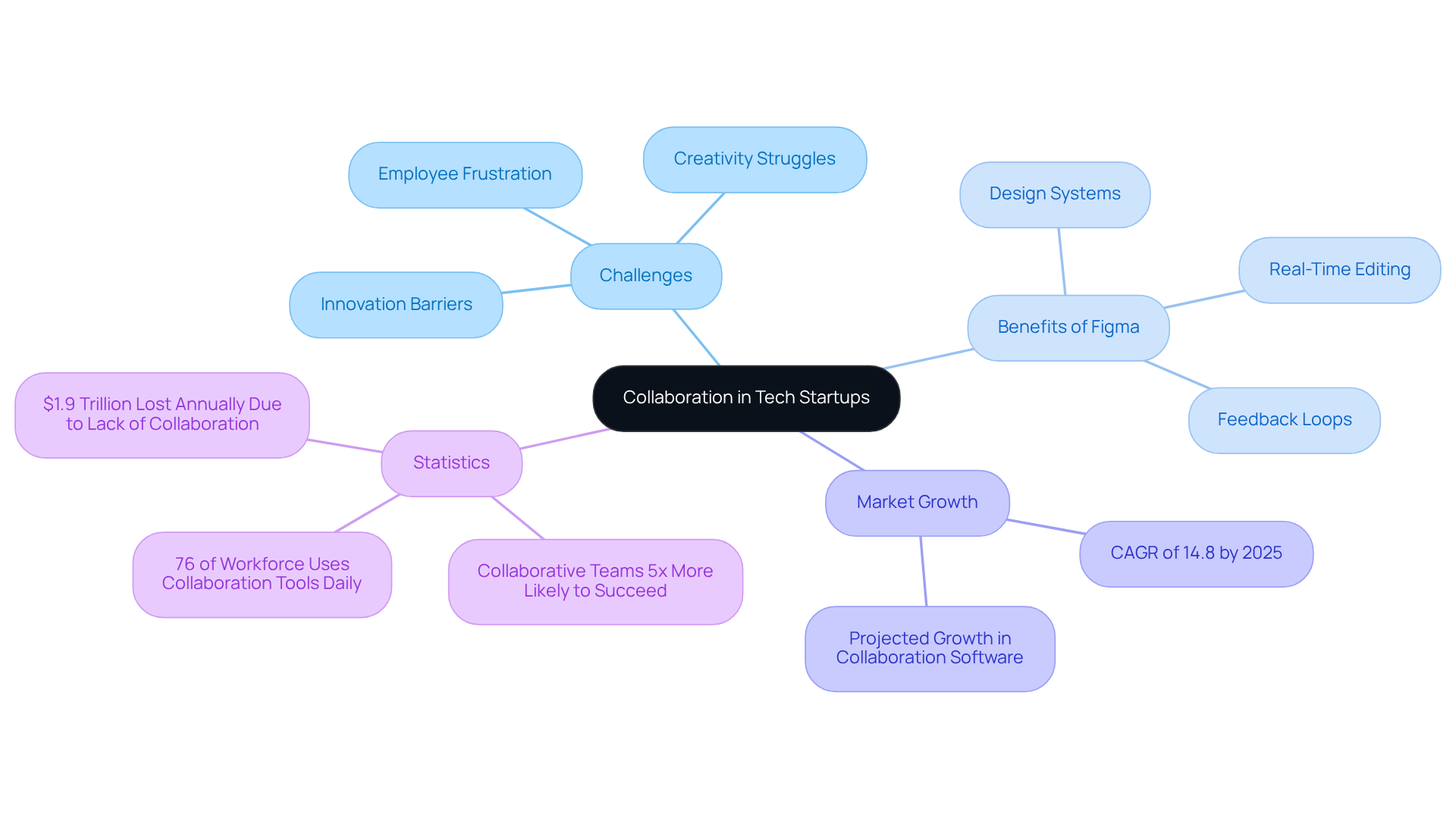
Canva: Simplifying Graphic Design with User-Friendly Features
For many new businesses, establishing a strong visual identity can feel overwhelming. The challenge lies in creating professional-quality graphics that truly resonate with their audience. It's a common struggle, especially when 73% of businesses recognize the importance of aesthetics in standing out from the competition.
Fortunately, Canva has stepped in to transform this landscape, making graphic creation accessible to all. Its intuitive drag-and-drop interface, paired with a vast library of templates, allows anyone to craft eye-catching visuals effortlessly. This simplicity is crucial for startups, who often lack dedicated creative teams yet still wish to engage effectively with their audience.
However, while Canva provides the tools, new businesses may still find themselves needing guidance to maximize their potential. This is where RNO1 shines, offering customized branding and digital platform solutions. By leveraging RNO1's expertise, startups can navigate Canva's features more effectively, ensuring their visual content not only looks good but also drives engagement. After all, visually appealing content generates 650% higher engagement on social media compared to text-only posts, highlighting the importance of a strong visual strategy.
As we look toward 2025, the trend of accessible software for visual creation continues to grow, with tools like Canva leading the charge. The graphic art market is projected to reach $50.2 billion by that time, and RNO1's innovative websites empower startups to harness these tools effectively, helping them stand out in a competitive landscape. Together, we can create a supportive community where new businesses thrive, using the right resources to tell their unique stories and connect with their audiences.
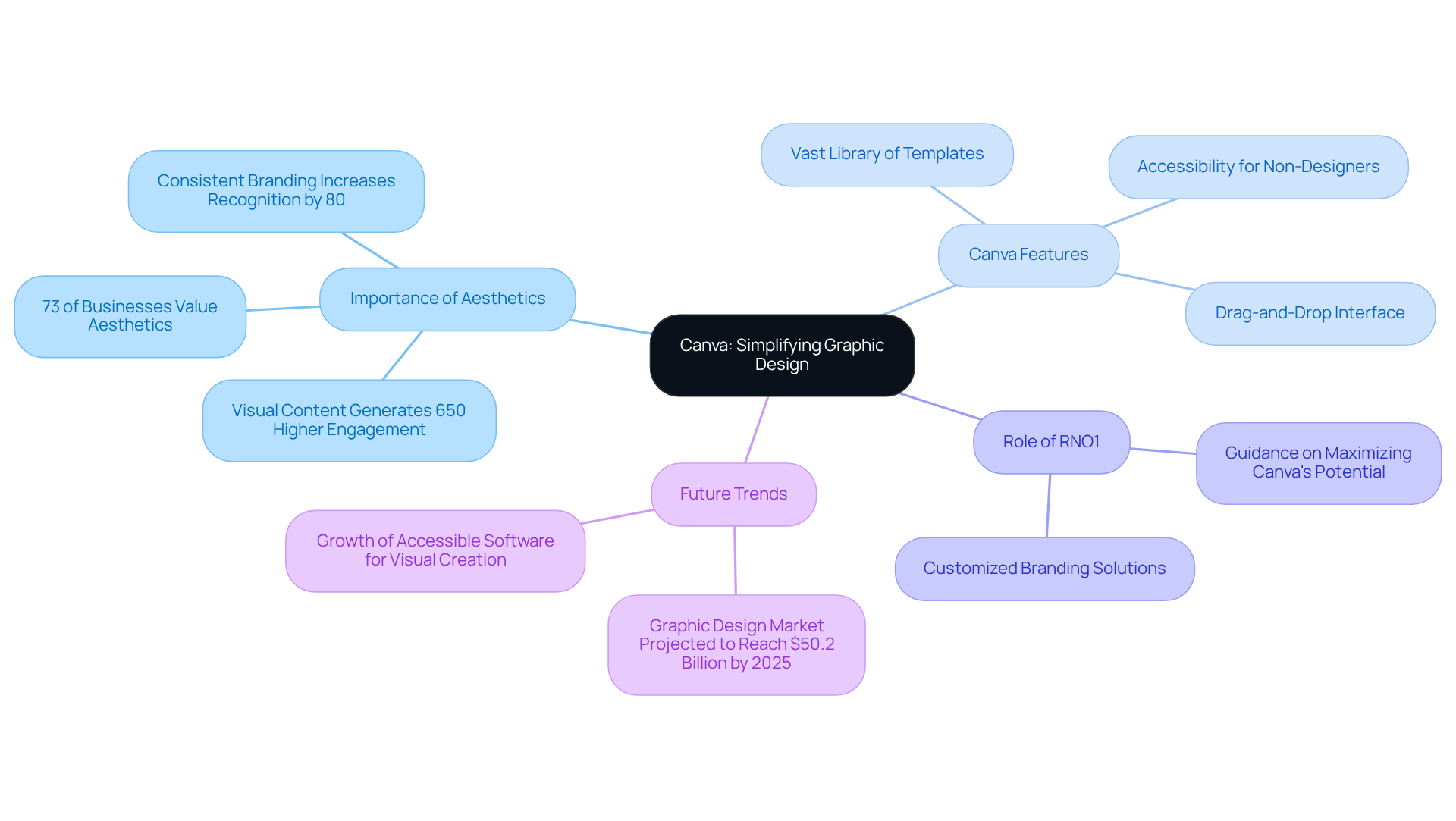
Medium: Enhancing Reading Experience with Clean, Minimalist Design
In today's fast-paced digital landscape, many startups struggle to capture and retain their audience's attention. This challenge can be frustrating, as it often feels like all your hard work is going unnoticed. It's disheartening when potential customers bounce away from your content, leaving you wondering what went wrong.
Medium has emerged as a beacon of hope for content consumption, showcasing how a clean, minimalist aesthetic can transform engagement. By prioritizing clarity and interaction, Medium allows readers to immerse themselves in the content, free from distractions. This approach has proven effective; research from Google reveals that websites with minimalist layouts experience a 15% lower bounce rate compared to more intricate formats. This simplicity not only holds visitors' attention but also encourages deeper connections with the content.
Moreover, the importance of being mobile-friendly cannot be overstated. Mobile-optimized websites boast a 40% greater conversion rate than their non-optimized counterparts, highlighting the practical advantages of adopting similar styling principles. As a startup founder, you can draw inspiration from Medium's strategy. By creating innovative websites that emphasize clarity and engagement, you can ensure that individuals can easily access and enjoy your material.
It's worth noting that a 2025 report found that 60% of marketers believe that design improvements directly impacted their revenue growth. This statistic underscores the financial benefits of focusing on design. By nurturing an environment where clarity and engagement thrive, you not only enhance the user experience but also pave the way for potential growth in your business. Together, let's embrace these principles and create innovative websites that allow your audience to feel valued and connected.
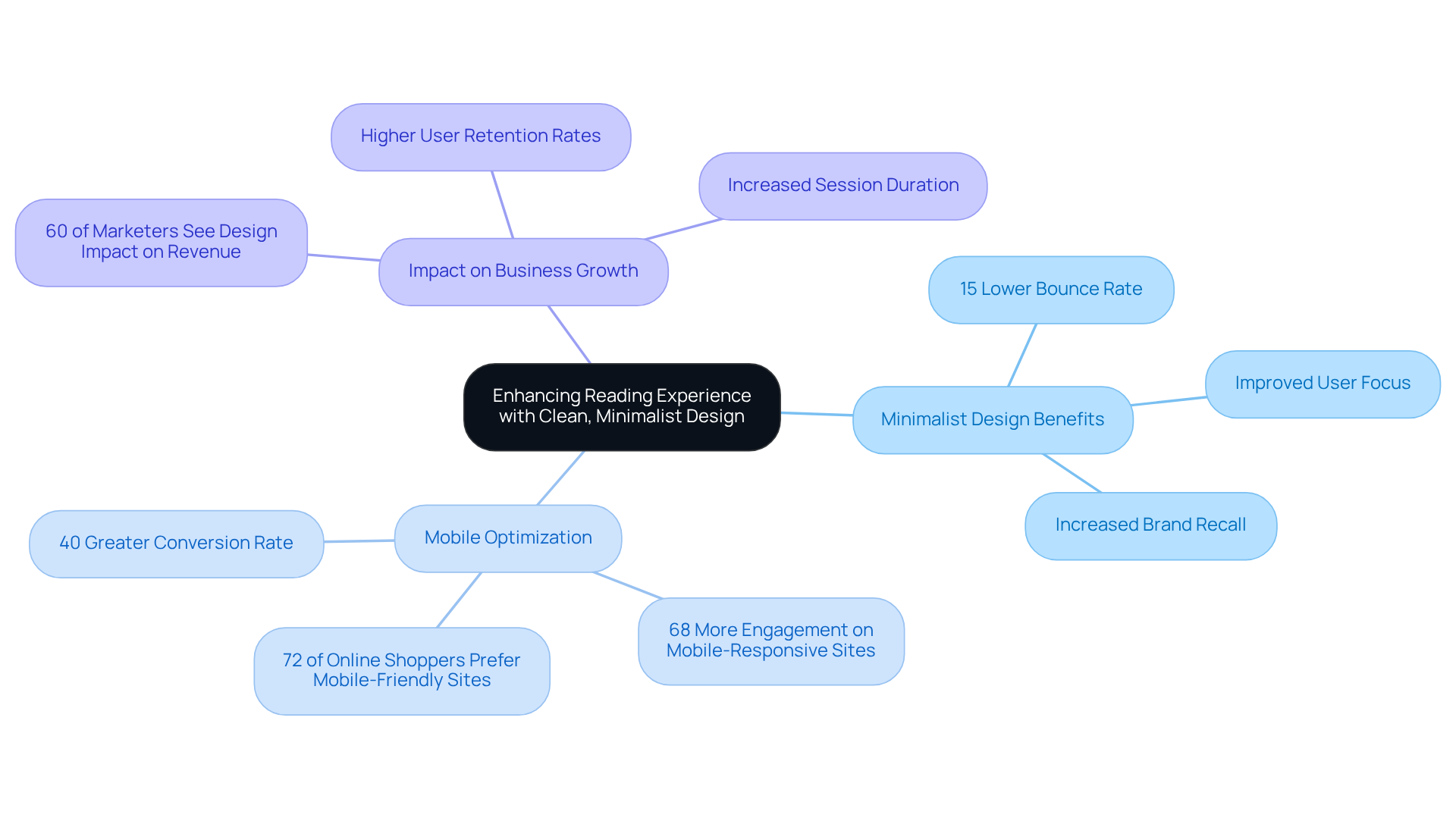
Spotify: Redefining Music Streaming with Personalized User Experiences
In today's competitive music streaming landscape, many tech startup founders grapple with the challenge of engaging their audiences. It can be disheartening to see potential listeners drift away, especially when you know that personalized experiences can make all the difference. Spotify has shown us that by providing tailored experiences, we can truly connect with individuals and enhance their satisfaction.
Key features like Discover Weekly and personalized playlists have not only transformed user engagement but have also significantly improved listener retention. Research from the International Journal of Information Management indicates that customized playlists can enhance audience retention by as much as 50%. This statistic underscores the importance of offering relevant content that meets the diverse needs of listeners.
As a startup founder, you might wonder how to implement such effective strategies. One solution lies in adopting data-driven personalization techniques. By enhancing your metadata and forming partnerships with influencers, you can ensure that your offerings resonate with your audience, fostering a sense of value and connection.
Moreover, by examining client behavior and gathering feedback, you can continuously refine your services, ultimately nurturing loyalty and enhancing overall client satisfaction. Remember, your journey in the music streaming sector is not just about technology; it’s about understanding and meeting the emotional needs of your listeners.
As we look ahead to 2025, the focus on personalization remains a vital trend. It’s essential to adapt to consumer needs in this ever-evolving market. Embrace this opportunity to create meaningful experiences that not only attract but also retain your audience, fostering a community around your brand.
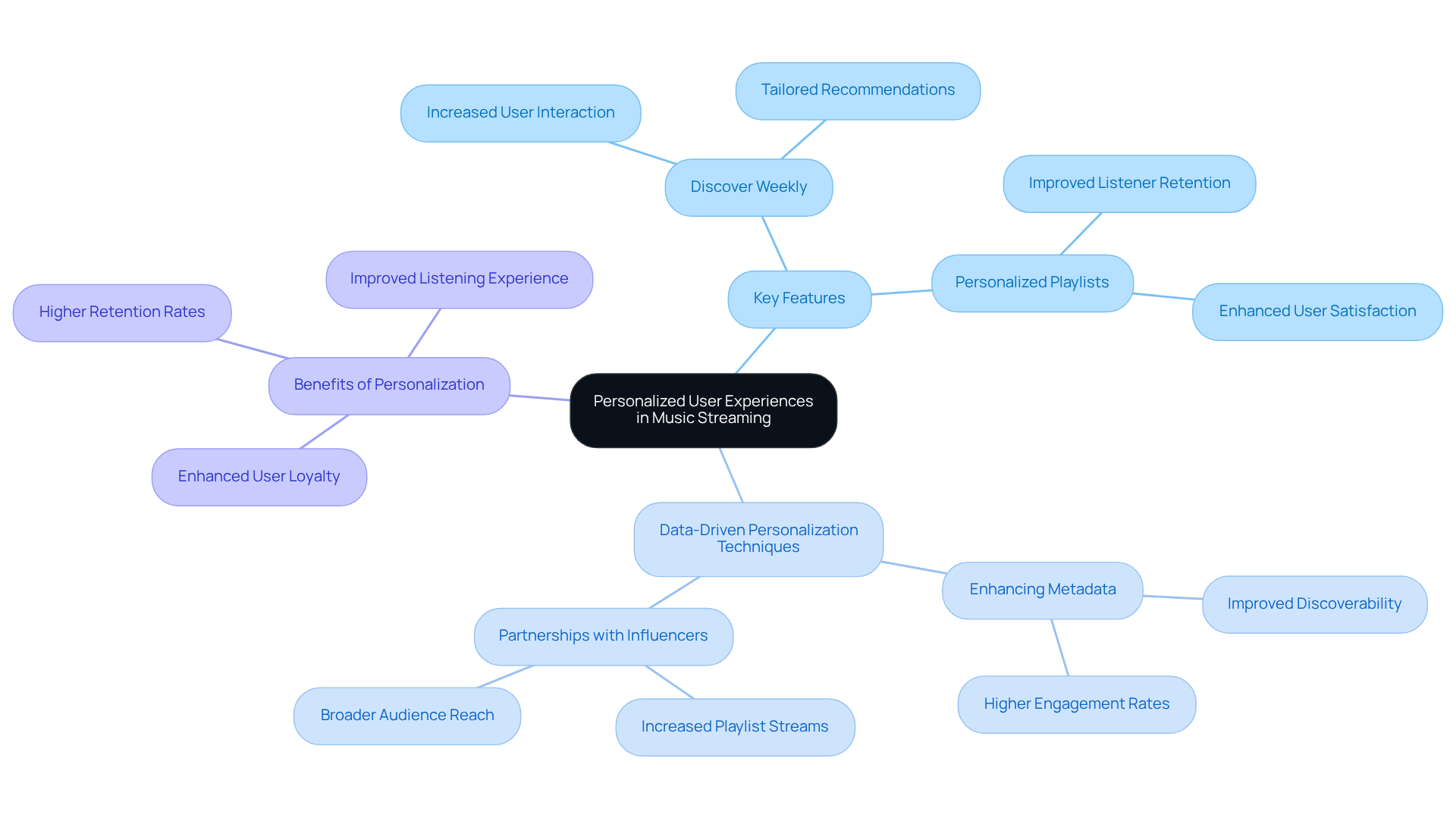
Amazon: Innovating E-Commerce with Tailored User Experiences
Amazon stands as a beacon in the e-commerce landscape, continuously enhancing customer interactions to cater to personal shopping preferences. However, many startups face the challenge of designing innovative websites that are engaging and efficient. The lack of personalized experiences can lead to missed opportunities for connection and growth. Features like personalized suggestions and streamlined checkout processes not only improve customer satisfaction but also significantly boost sales. In fact, studies reveal that personalized recommendations can drive a sales increase of up to 26%, while personalization can elevate revenue by 10% or more. Furthermore, 80% of companies report a rise in consumer spending—averaging 38% more—when interactions are tailored to individual needs.
Startups can draw inspiration from Amazon's approach by implementing similar strategies that prioritize the development of innovative websites. By focusing on personalization and convenience, new businesses can enhance their conversion rates through innovative websites and build lasting customer relationships. RNO1, a leading global branding and digital growth agency, emphasizes a design-focused methodology across every interaction, making design a top-of-mind solution for enhancing user engagement. For instance, companies like Wayfair have successfully personalized their homepages for logged-in customers, showcasing items based on previous purchases. This thoughtful approach not only fosters customer loyalty but also encourages repeat business.
As Simba Dube, Digital Marketing Lead, insightfully notes, "Personalization isn’t just an option anymore. If you’re operating an e-commerce site, you need to tailor your customers’ shopping journey." To begin implementing these strategies, startups should consider utilizing customer data to tailor their offerings and enhance the overall shopping experience. RNO1's performance marketing expertise, as demonstrated in their case study with Cirkul, illustrates how effective marketing strategies can drive hyper-scaling eCommerce success. By nurturing these relationships and focusing on the needs of their customers, startups can create a supportive ecosystem that fosters growth and connection.
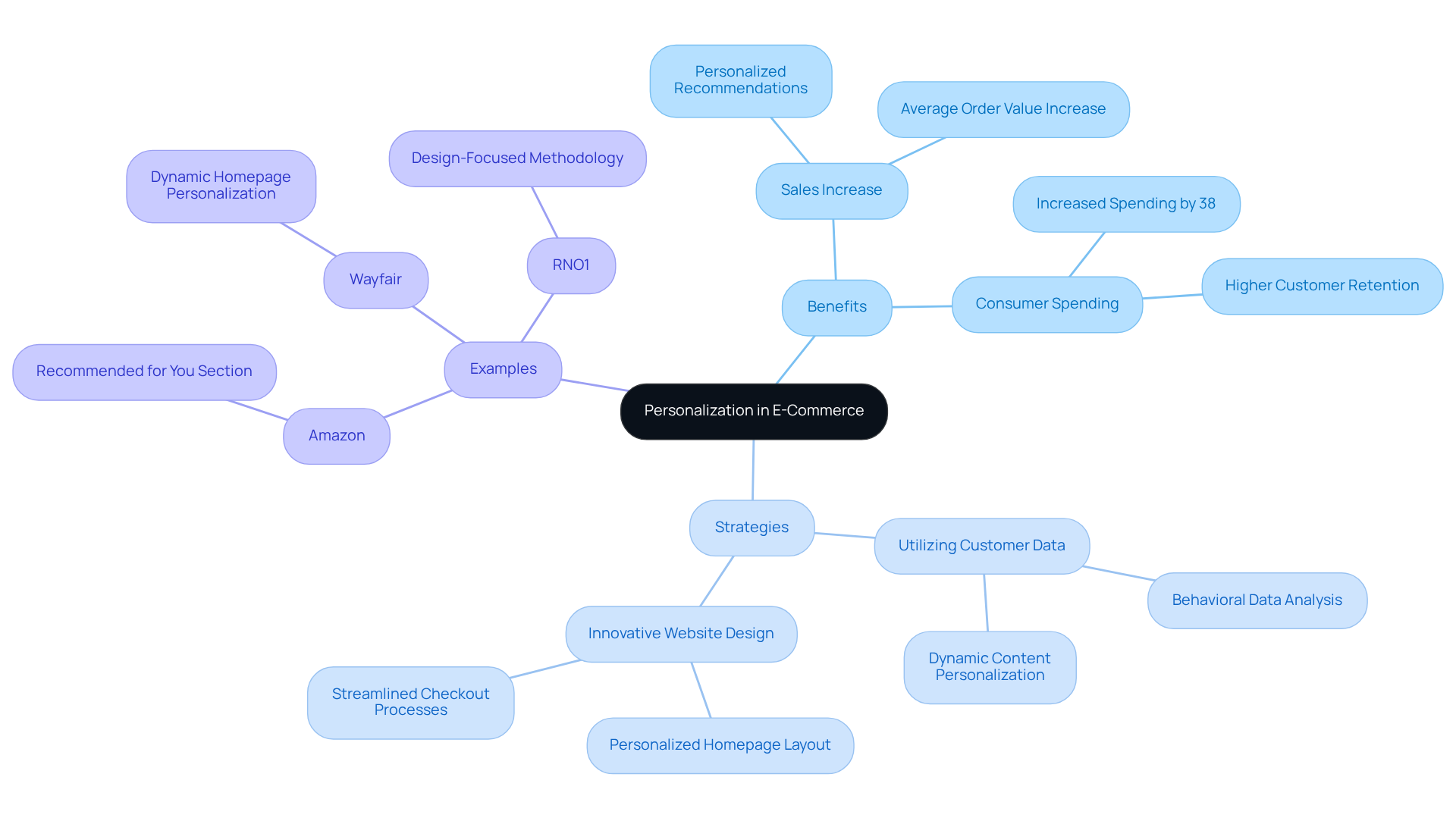
Conclusion
Innovative websites are transforming user experiences for startups, providing essential tools and strategies to navigate the complexities of the digital landscape. Many startups face the daunting challenge of connecting authentically with their audiences in a crowded market. This can lead to feelings of isolation and frustration, as the digital world becomes increasingly intricate. However, by leveraging cutting-edge design principles and user-centric approaches, these platforms empower new businesses to forge meaningful connections and drive sustainable growth.
Key players like RNO1, Stripe, Airbnb, Dropbox, Notion, Figma, Canva, Medium, Spotify, and Amazon offer unique solutions that address specific challenges faced by startups. For instance:
- RNO1's radical digital solutions
- Stripe's seamless payment experiences
- Airbnb's intuitive booking interfaces
- Figma's collaborative design tools
These platforms exemplify how thoughtful design can foster satisfaction and loyalty among users. The emphasis on personalization, simplicity, and usability across various sectors highlights the importance of adapting to evolving consumer expectations.
As we look towards 2025, it’s crucial for startups to embrace these innovative solutions and principles. By prioritizing user experience and leveraging the insights shared in this article, new businesses can enhance their offerings and cultivate a loyal customer base. The future of entrepreneurship lies in the ability to connect authentically with users, creating a supportive ecosystem where both startups and their audiences can thrive together. Remember, you are not alone on this journey; with the right tools and support, you can navigate the challenges ahead and build a successful future.
Frequently Asked Questions
What challenges do tech startup founders face in digital transformation?
Tech startup founders often struggle with adapting to rapid changes in the digital landscape, leading to frustration and uncertainty in creating meaningful connections with their audiences.
How does RNO1 support purpose-driven brands?
RNO1 empowers purpose-driven brands by providing radical solutions that reshape their experiences through comprehensive branding strategies, identity design, and user-centric digital platform development.
What is the significance of RNO1's subscription models?
RNO1's subscription models, such as Revolve and Retrn, offer ongoing support and encourage continuous innovation, helping brands to connect with their audiences through integrated digital campaigns.
How does Stripe enhance payment processing for startups?
Stripe enhances payment processing by integrating advanced features like one-click payments and customizable checkout flows, which reduce barriers to a smooth payment experience and foster customer satisfaction.
What impact does Stripe have on eCommerce revenue?
eCommerce merchants using Stripe's prebuilt payment UI have reported an average revenue increase of 10.5%, demonstrating the tangible benefits of adopting Stripe for payment solutions.
How does Airbnb improve the travel booking experience?
Airbnb improves the travel booking experience by utilizing an intuitive interface that simplifies the search and booking journey, featuring personalized recommendations and streamlined navigation.
What is the projected growth of the travel booking industry by 2025?
The travel booking industry is projected to reach $1.63 trillion by 2025, emphasizing the importance for new businesses to adopt innovative websites that reflect these trends.
Why is usability important in the travel sector?
Usability is crucial in the travel sector as it directly affects user satisfaction; 87% of business travelers express a desire for easier booking processes, which can enhance trust and reliability for startups.




